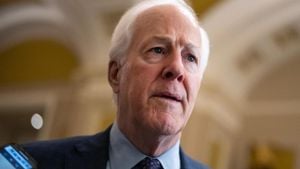Failing Hospitals Face Public Accountability Under New NHS Reforms
Health Secretary Wes Streeting has unveiled ambitious plans to introduce league tables aimed at naming and shaming consistently underperforming hospitals within the UK's National Health Service (NHS). Speaking at the NHS Providers conference, Streeting insisted there would be "no more rewards for failure" as part of his strategy to raise standards across the health service. The initiative follows mounting pressure over long waiting times and financial mismanagement within many Trusts, which Streeting describes as operating under conditions resembling those of global businesses.
Streeting's proposal includes implementing regular, publicly accessible league tables based on criteria such as patient wait times, financial stability, and leadership effectiveness of NHS Trusts. This review will be devoid of any leniency—those managers who are deemed to be failing will be held accountable and even replaced if needed. "Today we are announcing the reforms to make sure every penny of extra investment is well spent and to cut waiting times for patients," said Streeting. The intent is clear: to create not only accountability but also allow the best-performing Trusts to benefit financially from their superior management.
The Health Secretary's intentions focus predominantly on establishing transparency and efficiency within the NHS. Currently, many Trusts do not utilize their budget surpluses effectively, and the new plan aims to change this to allow top performers to reinvest these funds back toward improvements and resources. “Our health service must attract top talent, be transparent to the public who pay for it, and run as efficiently as global businesses,” Streeting articulated, indicating the urgency to modernize the NHS management structure.
Nevertheless, reactions from NHS leaders have been mixed, with many expressing valid concerns about the potential repercussions of such measures. Saffron Cordery, Deputy Chief Executive of NHS Providers, has emphasized the significance of addressing systemic issues, rather than chastising Trusts without considering external factors contributing to their struggles. "Taking steps to resolve these root causes is also important before any plans to introduce league tables and threats to sack failing managers are even put on the table," she stated. This is reflected in her assertion about poverty and staffing shortages, which are believed to be fundamentally impacting service delivery.
Cordery’s sentiment resonates with many within the NHS, who believe the league tables might do more harm than good by fostering fear among staff rather than encouraging morale and teamwork. During the discussion at the conference, many leaders underscored how performance metrics often fail to capture the unique challenges some Trusts face, particularly those situated in regions with higher needs due to demographic health disparities or inadequate staffing.
The announcement also noted the lack of specific metrics detailing how the upcoming league tables will assess the effectiveness of care delivery comprehensively. Critics voiced their skepticism about how accurately these tables would reflect patient care quality. Some Trusts may perform poorly not only due to local management decisions but also because of factors like historical under-investment or the socio-economic health of the populations they serve.
Currently, financial difficulties, chronic workforce shortages and the demands of modern healthcare are prevalent across many parts of the NHS. Some industry experts argue this systemic performance assessment could lead to mistrust among the public and drive patients away from their local services, fearing judgment of underperformance. This reinforces the idea echoed by Patricia Marquis of the Royal College of Nursing, who voiced apprehension about the potential consequences of demonizing healthcare leaders and mistaking their efforts against vast NHS pressures.
The fears of demoralizing the workforce extend to frontline staff who are already stretched thin. Risking the feelings of being stigmatized or 'named and shamed' does not align with the environment needed to improve care delivery. Such strategies, they argue, may strip away any room for constructive improvements under increasing pressure, cogent among staff dedicated to patient care.
Despite these apprehensions, Streeting remains steadfast, proposing to enforce financial sanctions against underperforming managers, and rewarding those who achieve exemplary patient care standards. He vowed: “There’ll be no more turning a blind eye to failure.” With potential ramifications looming, Streeting’s actions will likely pave the way for both structural changes and confrontational interactions with medical leaders as they navigate this new chapter of NHS reforms.
Organizations like Healthwatch England cautiously support the move, hoping it might address variations found across quality levels of care experienced by patients. Louise Ansari, Chief Executive of Healthwatch, believes improving the accountability of healthcare providers may benefit patient care outcomes. "Currently, living in an area with either an outstanding or poorly performing NHS trust feels like playing the postcode lottery," she lamented, underscoring the need for consistency and quality across board.
Questions now loom over how this initiative will effectively fold within the existing health framework, especially as the NHS grapples with unprecedented demands, recreational staff declines, and various funding challenges. This debate raises pivotal discussions around the role of management accountability versus systemic operational challenges, igniting discussions on finding balance and solutions for improving the entire healthcare framework, rather than only spotlighting where it falters.
Moving forward, it's clear the NHS is at the precipice of perhaps its most comprehensive reform to date. Whether these measures can eliminate inefficiency or merely push struggling Trusts more deeply toward adversity remains to be seen. But as things currently stand, the decision-makers within the NHS will have to navigate this controversial path carefully, balancing accountability with the necessary support for struggling entities within the health service.
Another layer to the reform discussions includes reviewing the costly reliance on agency staff—a practice costing around £3 billion annually. Streeting mentioned restrictive measures around agency usage may be introduced, particularly for roles like healthcare assistants. He suggested not allowing NHS staff who have left permanent positions to come back through agency routes for high-cost roles, which has been taxing on the NHS budget.
With NHS trust leaders grappling with increasing pressure from multiple fronts and the realities of the challenges faced daily, the forthcoming changes seem poised to radically reshape how care is delivered and perceived across the UK healthcare system. The path forward will require careful consideration, expansive discussion, and above all, commitment to ensuring patient-centric care remains the ultimate goal of these reform efforts.



